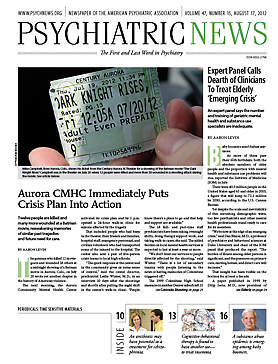The departments of Defense and Veterans Affairs have made strides in identifying and caring for troops and veterans with posttraumatic stress disorder (PTSD), but must continue efforts to improve coordination of care, standardize diagnosis and treatment, and gather better data on outcomes, according to a new report from the Institute of Medicine (IOM).
“If we can work collectively to improve those areas, we can get to where the leaders of the VA and DoD want to be, where all soldiers with PTSD get the care they need and return to full functioning,” said the IOM panel chair, Sandro Galea, M.D., Dr.P.H., a professor and chair of the Department of Epidemiology at the Mailman School of Public Health at Columbia University.
The report is based on two years of analysis of information available from published sources, interviews, and hearings. A second phase of the same panel’s inquiry will review data from ongoing treatment trials and other studies forthcoming from the departments of Defense (DoD) and Veterans Affairs (VA). Those results will be reported in 2014.
More than 2.6 million military personnel have served in Afghanistan since 2001 and in Iraq from 2003 to 2011, said the report. Data indicate that between 13 percent and 20 percent have or may develop PTSD.
In one sense, there was little that was “new” or “groundbreaking” about PTSD in the IOM’s report, but it was useful, nonetheless, said Galea in an interview.
“It is not surprising that we found a lack of coordination of care for our soldiers, or a host of barriers to care, or that programs are implemented in idiosyncratic ways,” he said. “But looking at all the information systematically and drawing conclusions in one place focuses our collective minds on what needs to be done.”
Both departments have taken strides to identify service members or veterans with PTSD, the IOM report pointed out. “[T]his progress needs to be followed by timely access to the best evidence-based care.”
The IOM panel called on the DoD and VA to “evaluate the efficacy, effectiveness, and implementation of all their PTSD screening, treatment, and rehabilitation services. … ” A number of prevention programs now in use in the various services were considered as well.
The two departments collaborated on a set of guidelines published in 2010, which now form the basis of their approach to PTSD.
The VA screens its patients for PTSD at least annually during primary care visits, and the IOM panel suggested that military treatment facilities and TRI-CARE (the DoD’s contractor for medical care) should do the same. They also advised that both departments continue investigating the use of telemental health and other technologies to overcome barriers to care.
The IOM urged the two departments to explore the value of complementary and alternative medicine interventions, from yoga and acupuncture to animal-assisted therapy, especially given their acceptability by patients, despite a small evidence base for their efficacy.
Both agencies must dig deeper, however, the IOM panel said.
“The DoD and the VA should [also] support neurobiology research that might help translate current knowledge of the neurobiology of PTSD to screening, diagnosis, and treatment approaches and might increase the understanding of the biologic basis of evidence-based therapies,” the panel suggested.
“The report affirms what we do and points out areas for further attention and research,” said Antonette Zeiss, Ph.D., chief consultant for the Office of Mental Health Services at the VA ’s headquarters in Washington, D.C., in an interview with Psychiatric News.
The VA has said that it will hire 1,600 mental health professionals and 300 support staff to meet the expanding need for services, said Zeiss.
“And we are trying to address internal obstacles like fear of stigma by integrating PTSD care into our primary care clinics,” she said. “We are especially trying to engage vets who don’t engage with traditional specialty mental health services.”
At DoD, the Army has been rolling out RESPECT-Mil, a program that screens for PTSD and depression at every visit in primary care settings.
The report also expressed the panel’s concern that while clinicians were trained to provide accepted therapies, there was little knowledge about how closely they actually adhered to the protocols.
The VA can track fidelity very well in training, said Zeiss. How to do so while covering millions of patients in day-today practice is another matter.
“We are developing templates to work with our electronic health records to record use of evidence-based psychotherapies and track the therapeutic alliance and how well the patient is doing session by session,” she said.
Overall, the IOM panel sought to encourage both departments even as they pointed out certain shortcomings.
“I’m optimistic,” said Galea. “I hope this report is one of a series of small drops in the bucket of change.”

